
Explore the key factors that impact vinyl fence installation costs in Columbus, OH, including labor, materials, permits, layout, design, and yard conditions.
Fence in your farm animals the right way


Talk to a pro about the type of animals, predators, and the amount of area you need to fence to determine the best fencing type for you.
Fencing like T-post, wood, and woven wire are doable yourself if you have some DIY experience and aren’t enclosing a large area.
Barbed wire is inexpensive, but it should be installed by a pro to ensure animal and human safety.
For animals that don’t lean or rub against the fence, welded and woven wire provide good protection and durability.
Synthetic fences look nice and contain livestock well, though the more complicated installation usually requires a pro.
Owning a farm comes with a lot of surprises, but losing any of your property’s value, animals, or product is one surprise that you don’t ever want to deal with. Fences are an affordable and effective way to protect yourself from that, whether you need to contain livestock, draw boundaries, or just get more privacy. It helps to research all the different types of farm fencing, especially if you’re hoping to build a fence yourself.
Let’s run through the many types of farm fencing there are to consider and how to choose what’s best for your property.
| Type of Fence | Best For |
|---|---|
| Woven wire | All types of livestock |
| Welded wire | Small animals |
| Wood | Horses |
| Metal T-post | Small, calm animals |
| Barbed wire | Deterring predators; large, calm livestock |
| Synthetic | Large livestock |
| Electric | Deterring predators |
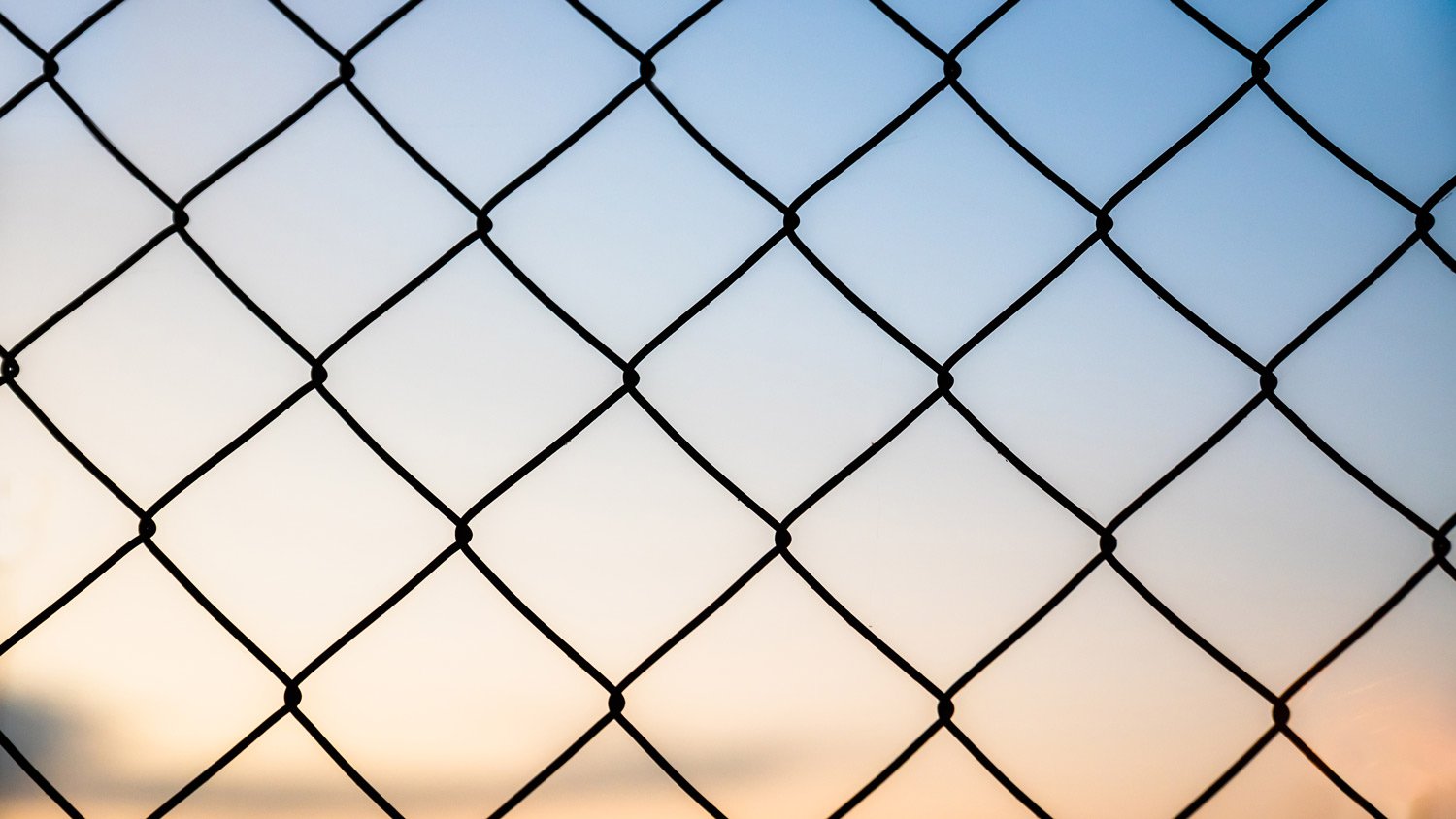
Woven wire fences are a lot like they sound: wires are spread along the fence in a grid pattern, with each vertical and horizontal wire knotted together. You can choose a woven wire fence in many different heights and opening sizes depending on what you need it for. For example, if you’re keeping goats contained, you will want smaller openings and tighter mesh because they often try to get their heads through the fence. Livestock that is larger and less likely to push against the fence, like cows, can do fine with a broader opening.
This is the fence you should choose for keeping livestock contained because, on top of its range of sizes, it’s highly durable. You can stretch and fix it easily, which makes it worth the slightly higher cost when compared to a similar welded wire fence.
| Pros | Cons |
|---|---|
| High durability | Higher cost |
| Versatile sizes | Vulnerable to corrosion |
| Safety | Less attractive |
Best for: Large, less active livestock
Woven wire is an impressively durable type of farm fencing that can withstand stretching, pests, rot, and discoloration.
One of the biggest benefits of a woven wire fence is how versatile it is. In addition to varying heights, this type offers a wide variety of opening sizes, allowing you to find tighter weaves for smaller animals and more open weaves for larger animals.
Woven wire is also a very safe option for all types of livestock. There’s little risk of a horse or goat getting tangled in the wire, unlike with barbed wire or electric fences. Just make sure to find the appropriate opening sizes to prevent any animals from getting stuck between the wires.
Compared to welded wire or electric fences, woven wire can be a more expensive option, especially for higher-quality wire options with lower gauges.
Even treated woven wire fences are vulnerable to corrosion over time, so reapplying rust-resistant coatings and wire-brushing any troublesome spots will be important in extending the lifespan of your fence.
Additionally, a woven wire fence doesn’t look as aesthetically pleasing as some other farm fence types, like wood or synthetic.
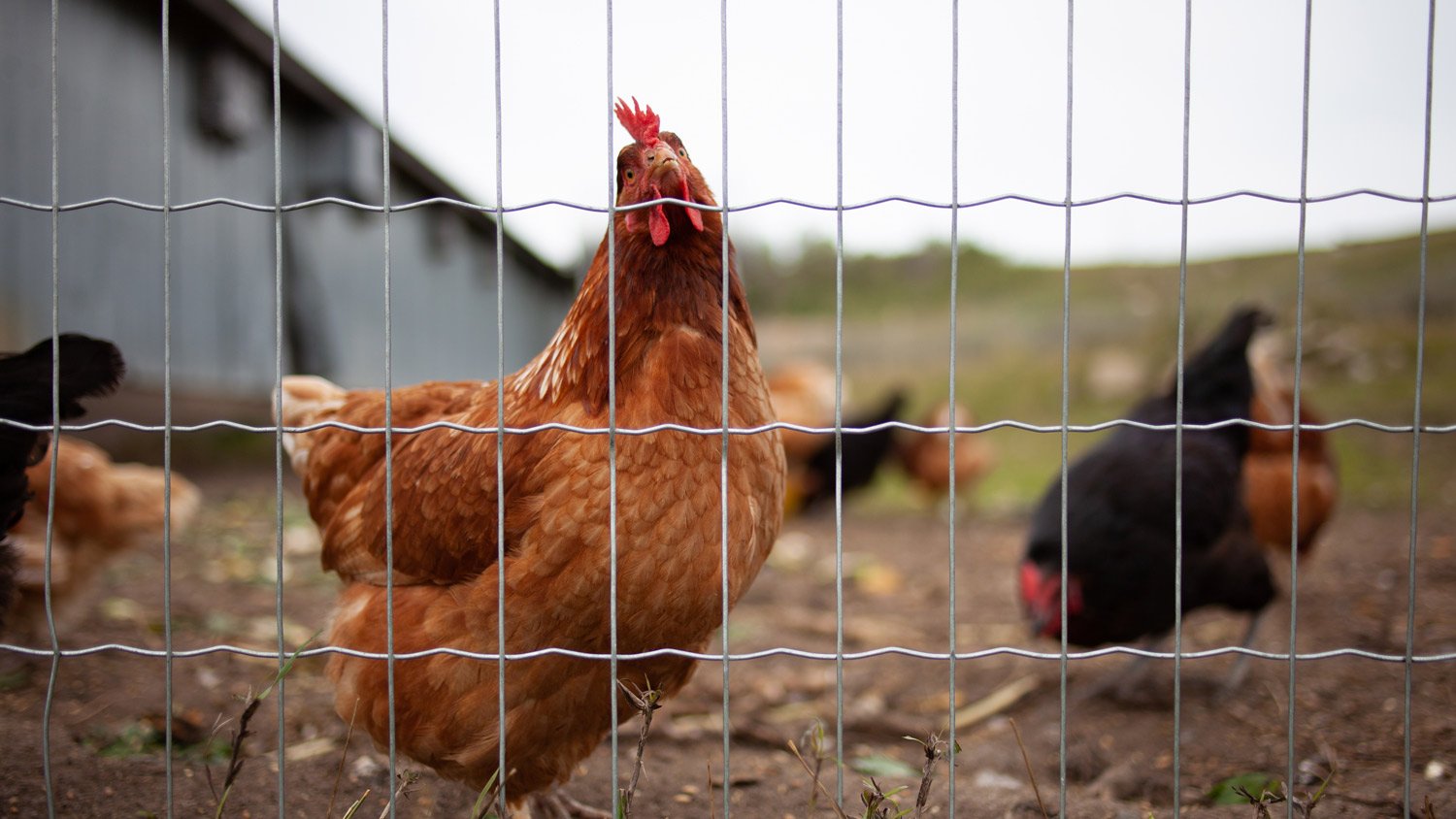
Like the more expensive woven wire fence, welded wire fencing creates a grid pattern that stretches across the entire length of the fence. Instead of vertical and horizontal wires being knotted together like in a woven wire fence, they’re welded together. While a welded wire fence isn’t as sturdy, it’s a perfect option for any kind of livestock that doesn’t stand or lean against the fence, like chickens. It’s also a good fence to protect your garden and land from deer or other wild animals.
| Pros | Cons |
|---|---|
| Lower cost | Less sturdy |
| Visibility | Harder to install on slopes |
| Low maintenance | Limited designs |
Best for: Gardens, small animals
If you’re on a tight budget for farm fencing, consider welded wire. It’s less expensive compared to woven wire, wood, and synthetic fences.
For those who love to appreciate their rural landscapes, welded wire won’t block those expansive views. The thin wires tend to fade into the background, even on taller fences.
Welded wire fencing is extremely low-maintenance, particularly for coated fencing. This material is resistant to rust, rot, and pest damage.
Welded wire isn’t as sturdy as, say, wood or synthetic materials, so it’s not always the right solution for containing horses or cattle. Larger livestock could lean against the fence and cause it to fall.
If you farm on hilly or otherwise challenging terrain, the welded wire panels can be hard to install. Consult with a pro on how to work around these obstacles.
Although welded wire fences won’t block the view, they won’t add much to it, either. This style doesn’t offer much in terms of design or color options.

Even though it’s often seen in children’s storybooks and the minds of city dwellers who yearn to change their lifestyle, real farmers rarely ever choose wooden fences for a large amount of acreage. It’s on the expensive end of the spectrum and only lasts for around 20 years if you keep up proper fence maintenance. On the plus side, it’s easy to build your own wood fence, and they’re an excellent option for smaller pastures. Wood fences are also popular for keeping horses, who can get tangled in wire.
| Pros | Cons |
|---|---|
| Easy to DIY | Higher cost |
| Attractive | Shorter lifespan |
| Easy to repair | High maintenance |
Best for: Horses and other active animals, smaller areas
Building a wood fence from scratch is a fairly straightforward task for property owners who want to save on labor costs. This also means it’s easier to customize the fence to your specific needs.
Wood is one of the most attractive fence options, and you can paint or stain it to further personalize the look.
Fortunately, wood fences are easy to repair. If one board is damaged, it’s easier to remove and replace it compared to some other fence types, like synthetic.
Wood fencing is one of the most expensive options, making it less practical for massive, multi-acre farms. It works best for smaller areas to minimize costs.
Even when treated, wood can be vulnerable to rot from moisture exposure, splintering or warping from extreme weather, and pest damage.
In order to extend the lifespan of a wood fence, you’ll need to be diligent about maintenance. Replace damaged boards ASAP, spray insecticides near fences to prevent pest damage, and refinish the fence every couple of years to better protect against moisture and pests. Unfortunately, frequent upkeep isn’t always practical for a busy farmer.
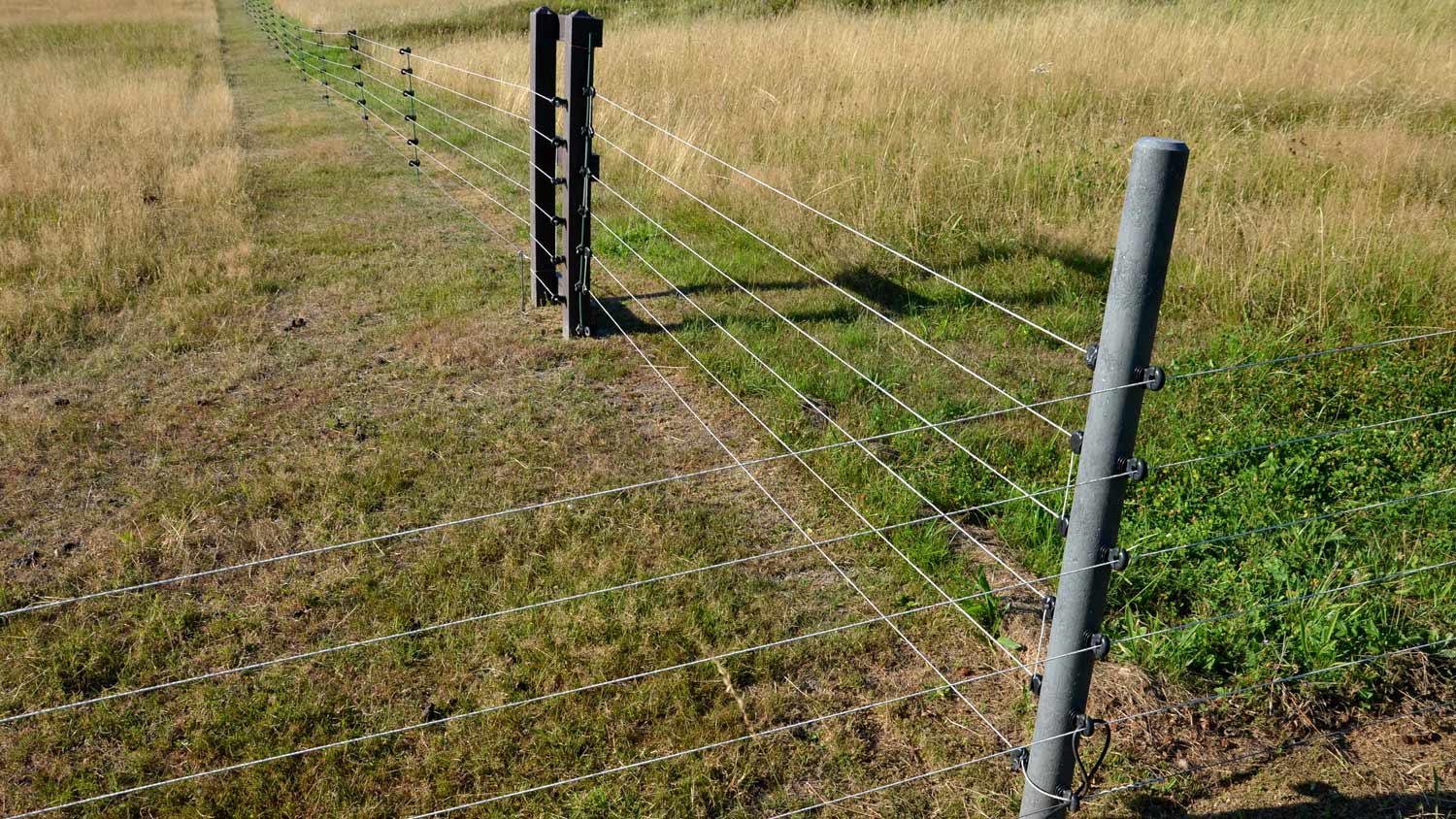
T-post fences are a great option if you want to install your fence yourself. A T-post fence is made of gridded wire stretched across a series of metal stakes that you can quickly drive into the ground with a sledgehammer. They usually run from 4-8 feet in height, and they’re easy to move whenever you’re done with them. A T-post fence is great for a small budget, but remember, they’re not as aesthetically pleasing as other types of farm fencing and may not have the durability your farm needs over time.
| Pros | Cons |
|---|---|
| Easy installation | Less durable |
| Lower cost | Less attractive |
| Flexibility | Lower stability |
Best for: Smaller, calmer animals, DIY installation
Metal T-posts are a great option if you want to save by installing the fence yourself. The posts and wires are all lightweight and easy to install with minimal tools.
The lightweight materials are also less expensive than other types of farm fencing, including wood and synthetic.
Because the posts are pounded into the ground rather than set in concrete, they’re easy to remove and move around when you decide to change up your farm plots.
Lightweight metal T-post fences can withstand rust and pests, but they aren’t very durable because they’re so lightweight.
Strong winds or large livestock could bring down a metal T-post fence, so this is best reserved for fencing in gardens or homes with smaller animals (so long as the animals aren’t interested in crawling under the fence).
Visually, metal T-post fencing isn’t the most attractive option. It doesn’t offer a variety of colors or styles, although it isn’t quite as menacing to look at as barbed wire.
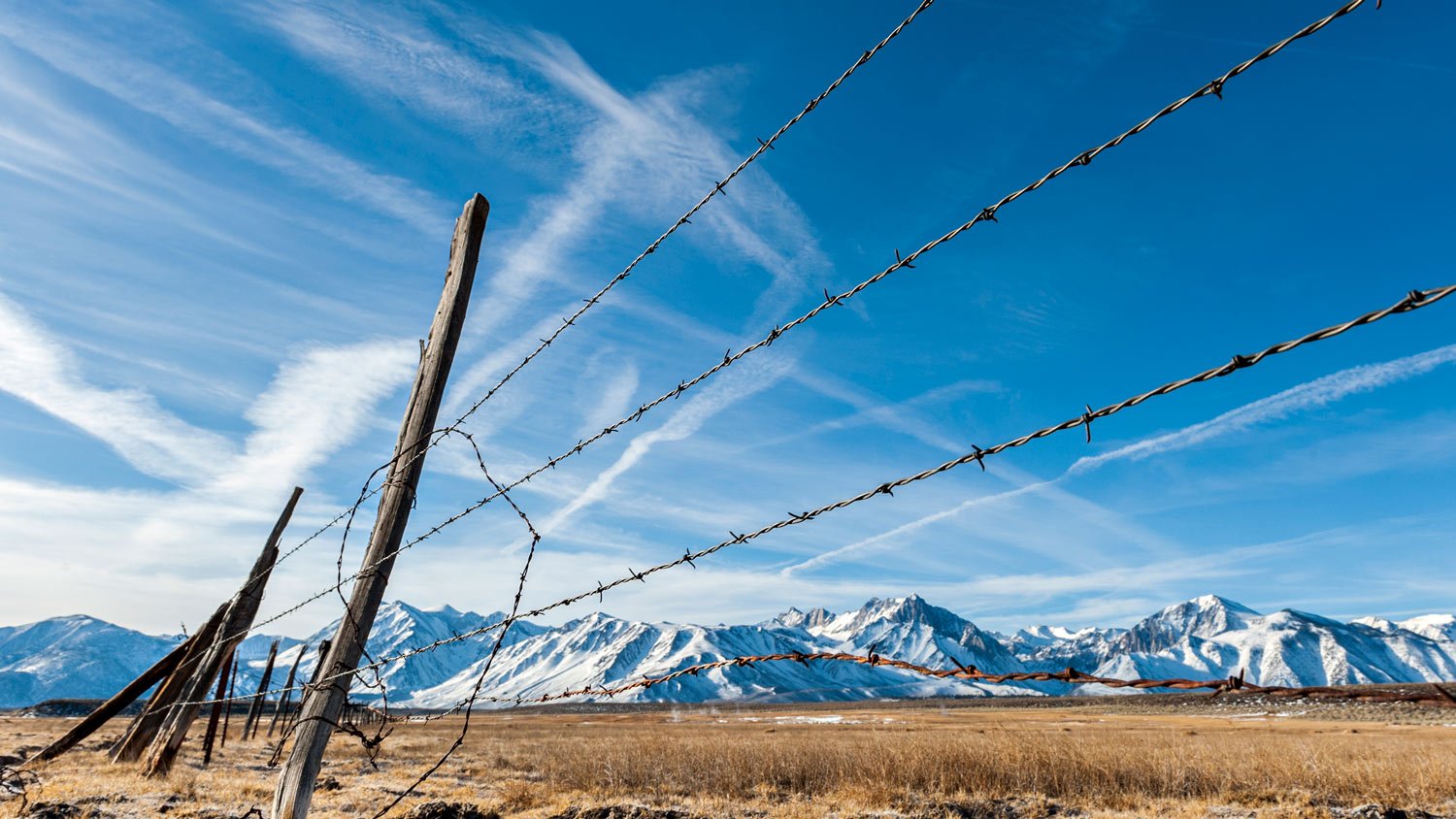
Barbed wire is often known for the pain it inflicts, and that can be useful when containing gentle livestock, like cattle. They’ll stay away from the fence once they learn it causes pricks to the skin—whereas a more active animal like a horse is in danger of mistakenly getting caught in it and should never be kept within a barbed-wire pasture. It’s also helpful to keep wild animals out. Installing a barbed wire fence costs an average of $4,000, but that depends on the type of barbed wire you’re looking for and how much you’ll need.
| Pros | Cons |
|---|---|
| Effective predator deterrant | Can be harmful |
| Lower cost | Difficult to install |
| Low maintenance | Less attractive |
Best for: Less active animals (like cows)
The sharp barbs on this type of fence can effectively keep predators, like coyotes, out of your farmland and away from your livestock. Compared to some other options, like synthetic fencing, barbed wire comes at a lower cost for both materials and labor.
Barbed wire fencing doesn’t require much in terms of upkeep. Unlike electric or wood varieties, this fence needs infrequent inspections and cleanup since it can withstand harsh weather, moisture, and pests.
Highly active animals like horses or goats shouldn’t be kept within barbed wire fences because they can accidentally get tangled in the fence. These fences can also be hurtful to other livestock, including calmer animals.
You’ll have to leave barbed wire fence installation to a pro. Otherwise, you could end up with quite a few scrapes and scratches from trying to DIY.
Barbed wire fencing isn’t known for its visual appeal. Even for farm use, the barbs can distract from otherwise picturesque views of the farm and its surroundings. Barbed wire also lacks the versatile design options that other materials offer.
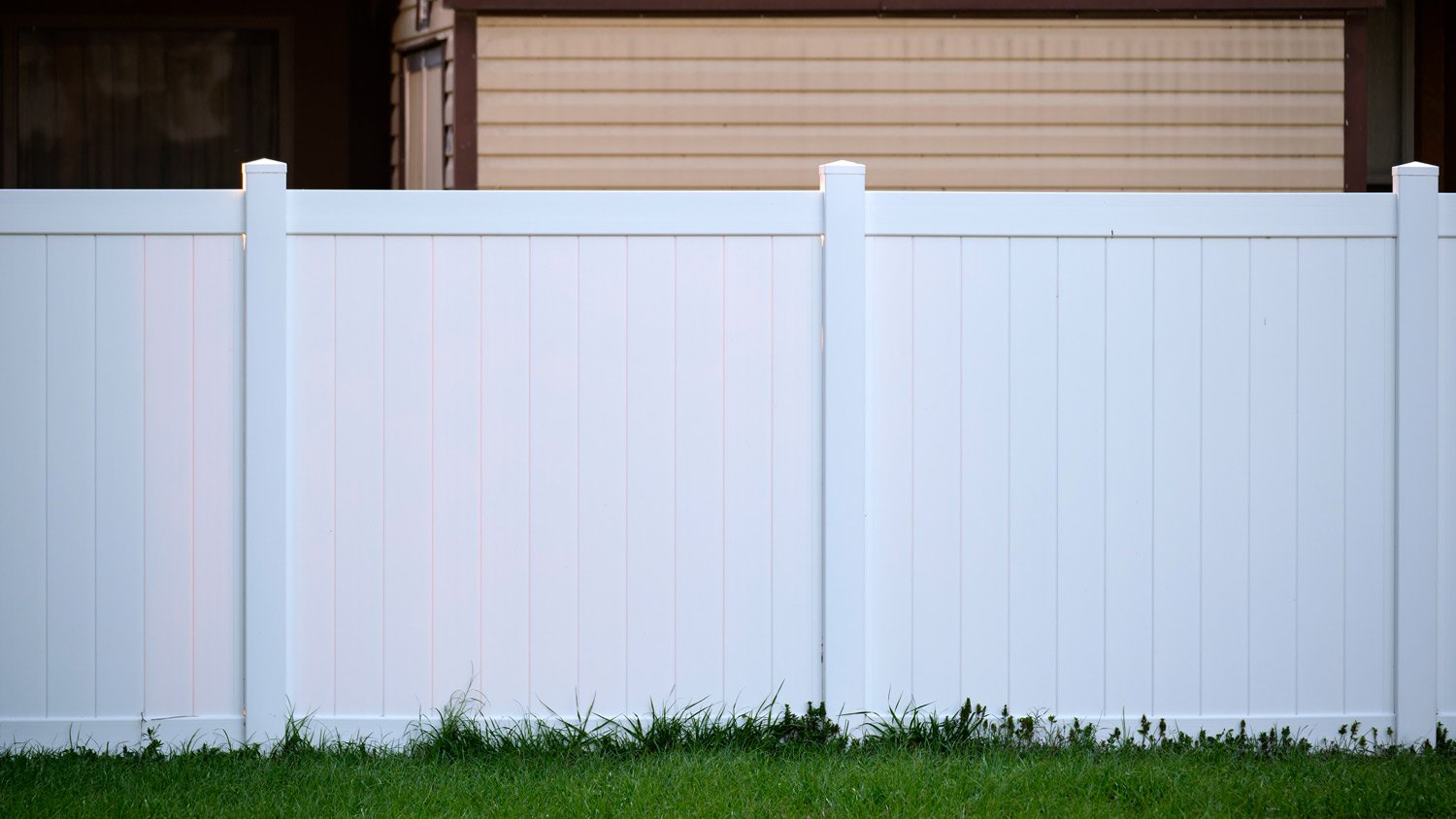
Synthetic fencing is made of any synthetic material, be it PVC, composite, or high-tensile polymer. The best part about this option is its ability to last through the ages since it’s resistant to rotting, rusting, splintering, or discoloring through any weather. This type of fencing usually requires a professional installation and is often chosen for horses or exotic animals like alpacas, emus, and llamas.
| Pros | Cons |
|---|---|
| High durability | Higher up-front costs |
| More privacy | Harder to repair |
| Withstands high winds | Harder to install |
Best for: Windy plains, large animals
Synthetic fences are highly durable because they naturally resist pests, moisture damage, and rust. That also makes them a low-maintenance option.
Because synthetic fences are often made from panels, they offer more privacy, doubling as both livestock containment and a barrier if your farm is near a busy road.
Whether from the cars zooming by or the wind sweeping down the plains, synthetic fences can withstand extremely high wind speeds compared to other types of farm fencing, like wire.
Synthetic fences may come at a higher cost up front, but fortunately, you get a strong, long-lasting fence in return for your investment.
This type of fence is harder to install because the panels can be heavy. Consider leaving this installation up to the pros if you don’t have several strong friends to help.
Their panel design also means synthetic fences are harder to repair. You often need to replace large sections of fence at a time to make a repair.

Electric fences can seem harsh since they inflict an electric shock on any animal (or human) in contact with it. But they are a very effective way to secure your property. Electric fences are made of horizontal, electric-powered wires affixed to insulated vertical stakes. They’re often used for poultry and livestock farms and are best installed by a professional.
| Pros | Cons |
|---|---|
| Effective predator deterrant | Can be harmful |
| Lower up-front cost | Harder to install |
| Flexibility | Higher maintenance |
Best for: Deterring predators
Electric fences can be highly effective at deterring predators. While predators can squeeze through other types of farm fences, an electric fence is more likely to shock and scare animals away from your livestock.
Electric fences are made with lightweight and widely available materials, making them less costly to install.
With its lightweight metal wires, an electric fence is also easy to install in challenging sites and move if you decide to shift your livestock to another part of the farm. While they’re easier to move around, electric fences should still be handled by a pro if you decide to change the layout.
One of the biggest drawbacks of an electric fence is that it requires precise installation and regular inspections to make sure it’s as safe and humane as possible. While the shocks can help deter predators from reaching your farm animals, it’s also important that the electricity doesn’t actually do any harm from improper installation or high settings.
Because correct installation will ensure a properly working fence, you’ll want to leave electric fence installation to the pros.
You’ll need to regularly inspect and maintain an electric fence and the area around the fence. If there are tall grasses, weeds, or other obstructions near the fence, the fence can trigger an ongoing shock that wears out the fence. The fence is also at risk of rusting if you don’t maintain it.
The best fence for your farm depends on your personal needs: do you need to keep livestock contained? Are there predatory animals you need to keep out? What kind of cost are you willing to spend on your fence?
If your farm holds livestock, there are different types of farm fencing specific to each animal. Barbed wire, electric fencing, and synthetic fences are standard options for cattle. But one of the most popular pig fences is welded wire, thanks to its durability against tearing or collapsing. Welded wire or wood fencing is also preferred for horses, though there are smoother designs made to be safer for horses to brush against.
There are dozens of different styles of each type of farm fencing, so do your research before choosing the best fence for your property.
If you’re handy and know how to do most basic carpentry and building, chances are you can handle the installation required of a metal T-post or woven wire fence. However, for most fences, it’s best to leave the installation to a local fencing installation and repair company. Always check credentials and past reviews before hiring a fence contractor to make sure you’re confident in their ability to get the job done. This is especially true if you’ve got a lot of land to cover and need to fence in a large acreage. Remember that many fences require a building permit to install, which you must get squared away before embarking on the project.
Window Depot did an amazing job on my deck. I wasnt sure what I wanted to do, but their composite decking was affordable and will last a long time. I am excited to have family over, and I am no longer embarrassed by my backyard. Jeff and the ground crew were polite, respectful, and caring for...
We used Unique Hardwood Floor LLC three years ago to work on the floors of a 70 year old home that needed a great deal of work. Some floors needed repairs, some were replaced and others just needed to be refinished. It was a complicated job as they needed to blend the old and the new to...
While Naaman and Mike were very professional and amicable to work with, there were issues in this project that makes giving a higher rating impossible. We had several communications issues that delayed completion. The roofers accessed the property without communicating with me. Just showed up...
We hired Andrew and the team from Midwest Lightscapes for a custom lighting design and installation on a Victorian Village home. The house had outdated low-voltage halogen outdoor lights and many of them were not working. Andrew designed and installed a new system including uplighting on the...
Mr. Potter is professional and gave us excellent advice for the fence. He is honest and straight forward. His crew finished the job quickly and did an excellent job. The fence is beautiful and is a major improvement of our backyard.
He did a very good job building the first fence at a very reasonable price. He was a personable guy to deal with and I would highly recommend him to others.
Excellent work; great attention to detail; makes good suggestions but always goes along with what the customer requests; clean and tidy; intelligent; very reasonable rates. I would definitely hire him again for other home projects. He can do a variety of different jobs including: drywall,...
Installed a fence in the back yard. High quality cedar fence.
HAD ISSUES WITH RETURNING PHONE CALLS DURING BID PROCESS AND SCHEDULING JOB. BUT JOB DID COME IN $100 LESS THAN BID. WORKERS WERE PROFESSIONAL, PROMPT, AND DID NOT GET SEALER ON NEIGHBORING FENCE.
I CALLED AND LEFT A VOICE MAIL AND BOB CALLED ME BACK WITHIN 15 MINUTES. HE CAME OUT TO DISMANTLE THE SWING SET ON THE SAME DAY. HE WAS VERY PLEASANT, AND HAULED AWAY THE WHOLE SWING SET AND LEFT NO DEBRIS BEHIND. I WAS VERY SATISFIED WITH THE WORK.
From average costs to expert advice, get all the answers you need to get your job done.

Explore the key factors that impact vinyl fence installation costs in Columbus, OH, including labor, materials, permits, layout, design, and yard conditions.

An electric fence is an effective way to keep animals in your yard. Learn how much different electric fences cost, in this guide.

Silt fence installation costs vary depending on the size of the lot, the fencing type, and the installation technique. Use this guide to get the budget right.
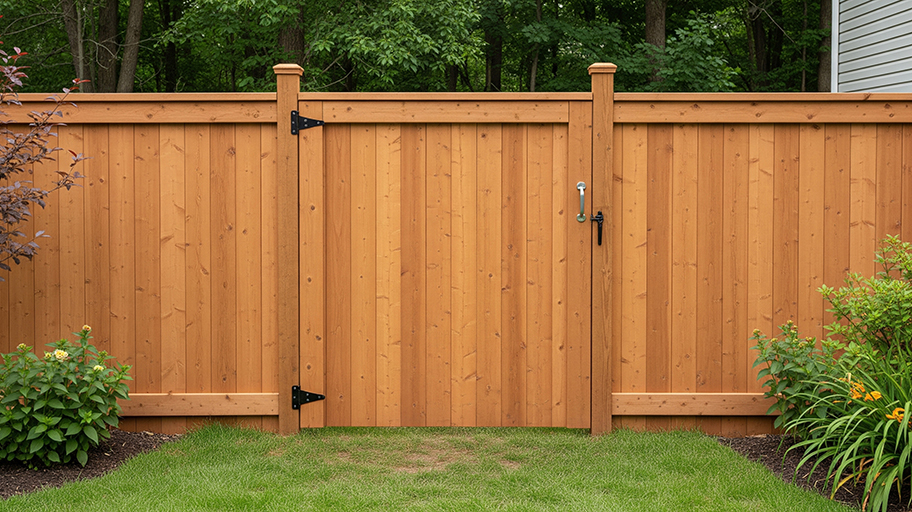
If your gate has significant space underneath, your yard isn’t fully secure. This guide offers three easy methods for how to fix a gap under a fence gate.

Winter is a great time to install a fence as it can save you money and preserve your landscaping. Here’s everything you need to know about installing a fence in winter, plus tips for completing the project safely and efficiently.

Wondering how to hire a fence contractor who will do the perfect job? Use our tips to figure out which questions to ask contractors before you hire one.